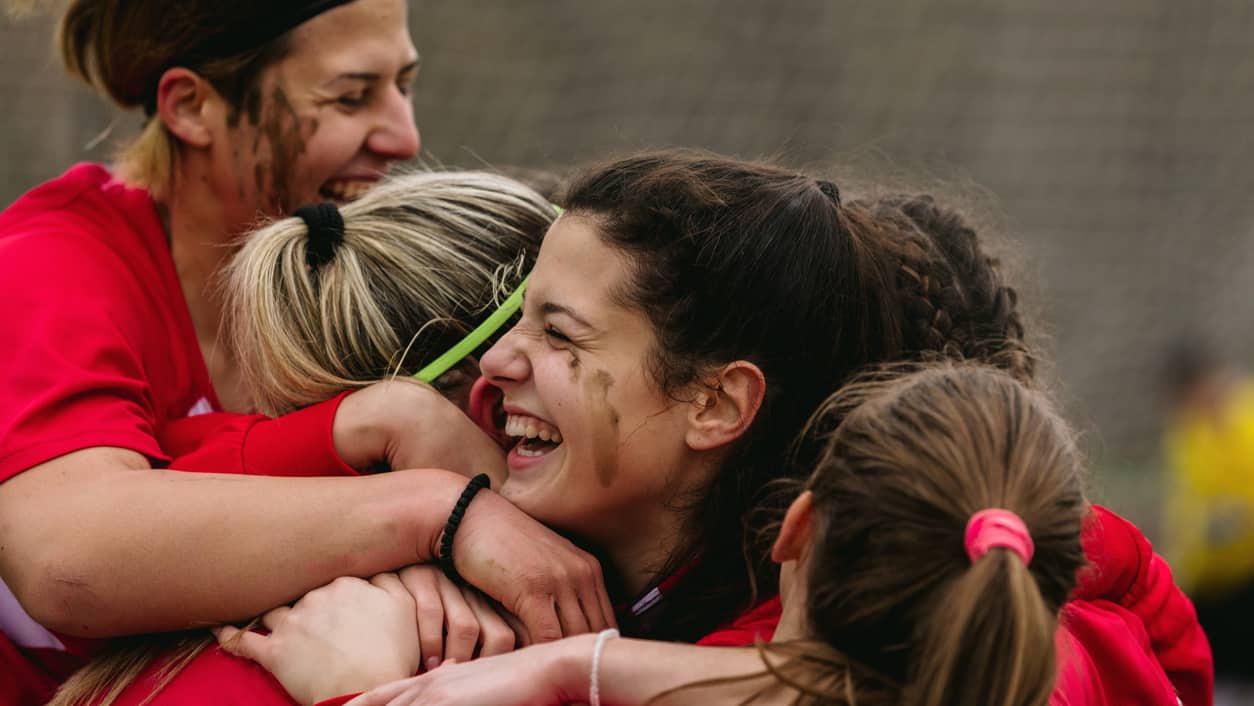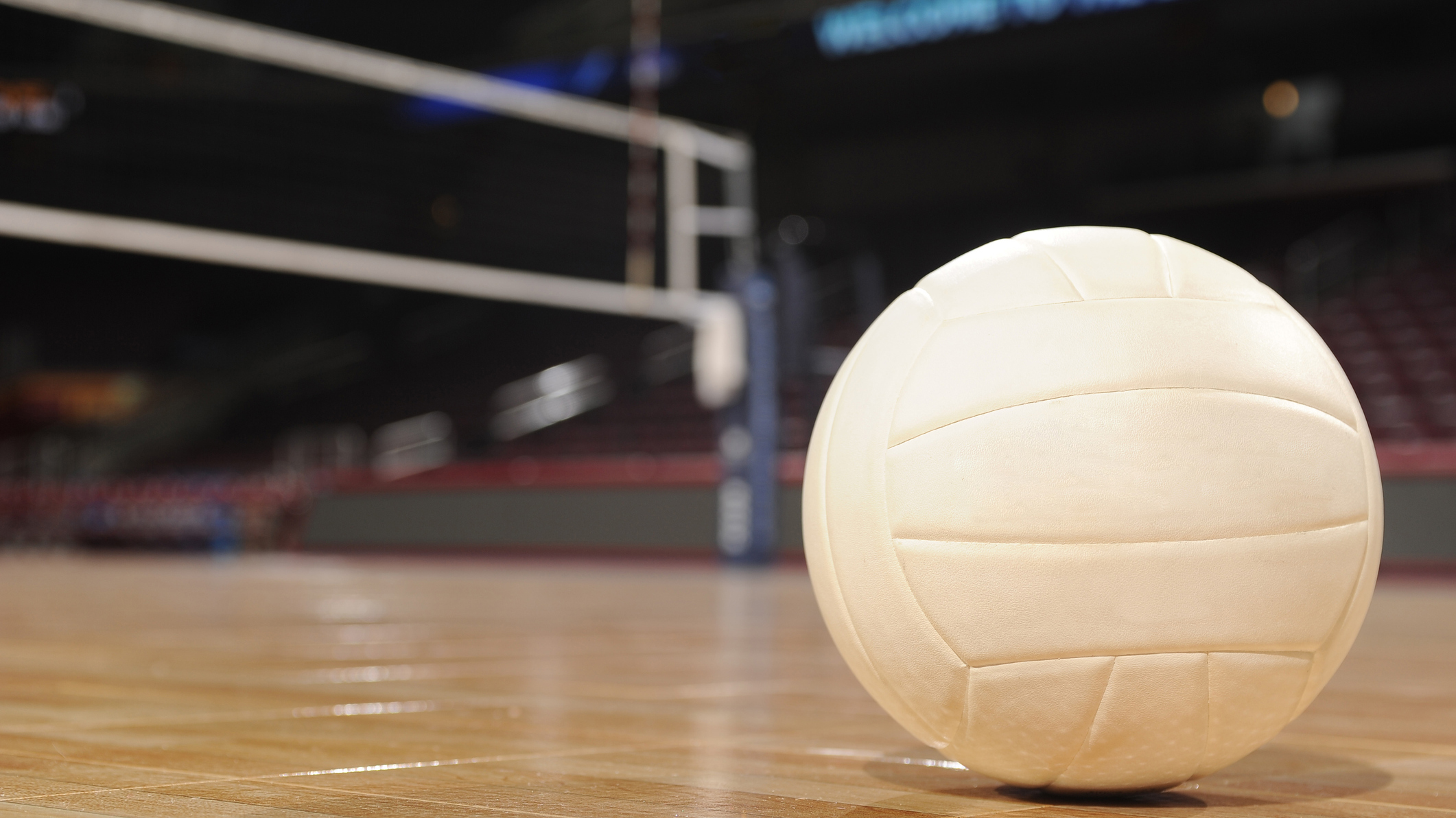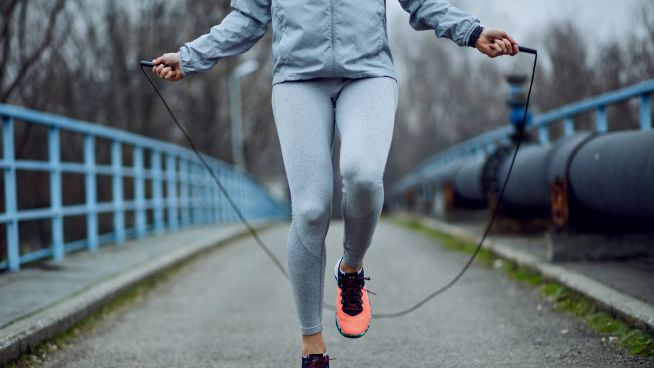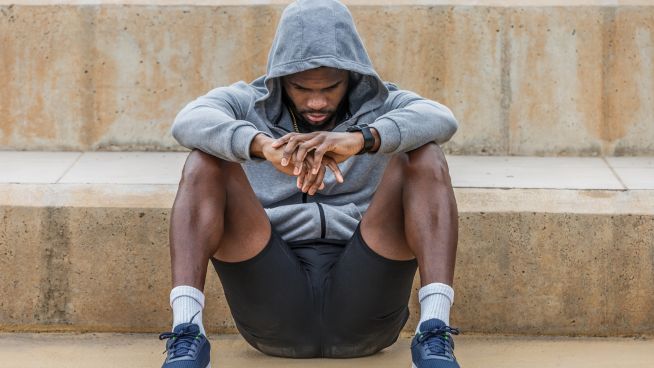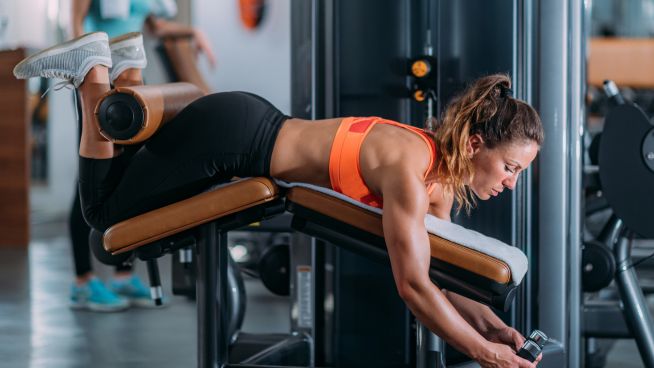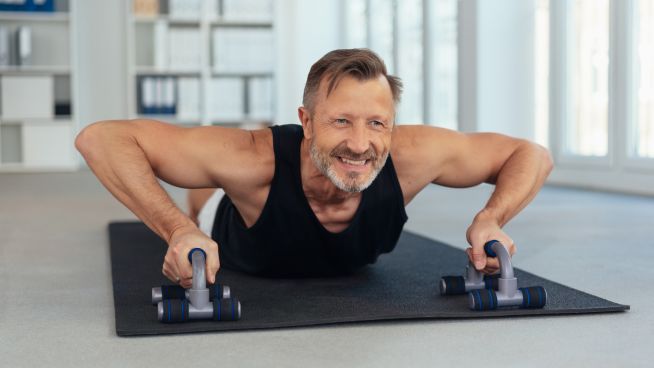Fearless Femme: Pro Mountain Biker Georgia Gould

Georgia Gould racing for the win at the 2012 UCI Mountain Bike Cross-Country race at Mont-Sainte-Anne in Quebec. (Photo: Colin Meagher)
Georgia Gould didn’t take her first mountain bike ride until she was 19 years old. Nine years later, she was careening through the cross-country mountain bike course at the Beijing Olympic Games for Team USA. Finally, last year, Gould proudly brought home a bronze medal from the London Games.
At age 33, Gould is determined to change mountain biking—specifically the way the sport treats women. With a playful expression, she tells STACK why the sport of cycling needs to catch up with the times.
Follow along as Gould opens up about her greatest fears, her awkward love of gangsta rap, and her strategy for winning the World Cup this year.
STACK: You were 19 years old when you went on your first mountain bike ride. Who took you, and where did you go?
Gould: I actually went by myself. I was house sitting for my dad out in Sun Valley, Idaho, and I had been trail running to get in shape. Then I saw lots of people out riding mountain bikes, and I thought, that seems like a cool way to see more of the trails. You can only go so far running, especially when you’re not in that kind of shape.
My stepmom had a cool full-suspension bike in the garage. So I dug out a pair of teal bike shorts and thought, these will go perfectly with my purple sports bra! I hit the trail in just a sports bra and teal shorts, and it was awesome.
Then I totally ate it on the downhill.
I didn’t know that when you’re coasting, you need to keep your pedal level. I clipped my pedal on a rock, went over the bars and slid on my shoulder. And then I was like, ok, so maybe a jersey would have been a good idea. Maybe that’s why people wear shirts.
But I really liked it. And I kept doing it. Shortly after that, I met my husband, who’s a big mountain biker, and ended up doing more riding and less running. It wasn’t too long before I found a race I could enter.
STACK: How did your first year of racing the National Series as a pro turn out?
Gould: I was still working part time, and my husband Dusty and I were driving to all the races and camping. I ended up placing ninth overall in both the short track series and the cross-country series.
I wasn’t getting paid or anything. I had a regional sponsorship from Team Tamarak. I think they gave me $1,500 for expenses, but that’s nowhere near what it actually costs.
By the end of the season I was so broke that I couldn’t do it anymore. I would call my dad and ask him to put gas money in my bank account so we could drive home. My parents were super supportive, but you can only bare-bones it along for so long before you’re just like, all right, this isn’t really that awesome.
Luckily, at the end of that season, the team manager from Luna contacted me and asked me if I’d come down to Interbike in Las Vegas for an interview. So, I was like, are you kidding me? Uhhh, yeah!
STACK: That’s huge! Is that when biking switched from a passion to a career for you?
Gould: Yeah, it was huge. My first year on the team, I made $10,000 and my expenses were paid—it was a huge step up from where I was before. That support let me focus on racing, training and recovering.
STACK: And not terribly long into your career, you found yourself at the Olympics. You seem like a pretty relaxed person, but there obviously must be an undertone at that event that made you think, Wow, I’m at the Olympics today.
Gould: Not just an undertone, it’s an overtone.
You do the same preparation as any other race. But you show up on race day and there’s this buzzing in the air. It’s different from the athlete’s perspective. You can feel it from the fans. There’s just a different energy in the air and it’s weird. You try to tell yourself, this is just a race like any other. They just call it a different thing. But then you’re like, it’s the Olympics!
That’s one reason why I made the decision to stay in a hotel close to the course instead of in the athlete village. The athlete village is awesome and amazing and overwhelming. But by the time my race came around—which was the second-to-last day of the whole Olympics—everyone else had done their competitions. So they’re partying. It’s loud, its rowdy.
That’s not the kind of preparation for a race that I’m used to, and it’s the one thing that sucks about having your race be on the last two days of the Olympics. You don’t really get the whole Olympic experience. People ask me whom I met or what events I saw, and my response is, nobody and nothing.
But I’m not sad about the way that I did it. I think that was key for me to have a good race.
STACK: Well, it’s hard to argue with the results—that bronze medal. With all of the energy surrounding the event, how did you stay focused on race day? Do you have any race day rituals?
Gould: For me it’s not, oh I have to have a banana and two tablespoons of peanut butter. Having things too regimented doesn’t work for me. We travel so much. Sometimes you don’t have your special cereal or your special thing.
No one piece is the key to it. It’s figuring out how to put all those little pieces together. It’s about not being too anal about any one little thing, but being just anal enough about it all.
STACK: When it comes to training, do you listen to music on rides?
Gould: I do. Not all my rides, but yeah, I definitely do.
STACK: What’s on your playlist?
Gould: It’s such a mishmash. I go through phases. A really good iPod mix is hard. You have to handpick enough songs to last a four-hour ride. That’s a lot of songs! And it only lasts for a little while before you get totally sick of it.
I try to listen to upbeat music. I’ve got a lot of White Stripes and Black Keys. But I also have a bunch of awesome ’80s one-hit wonders. I have one mix that’s all club music like Ludacris and Missy Elliott for when I’m feeling really gangsta.
“Skinny white girl pedaling up the hill listening to Ludacris.” Maybe you shouldn’t print that. That’s kind of embarrassing.
STACK: Yeah right, I’m making that the title of the piece.
Gould: Ha! But yes, I listen to all kinds of stuff. I do it more by songs, you know, how some songs just make you say, Ugh, that is an awesome song! It can be anything from a club song to a Rolling Stones song. There’s some that are just awesome. My mixes are definitely sort of a mishmash. But it works for me.
STACK: Mountain bike courses can be pretty gnarly. Have you ever stepped away from part of a competition that just felt too risky?
Gould: Absolutely. The World Cup has been incorporating some really scary features. They’re becoming a little more man-made, with jumps and drop-offs and huge rock gardens.
A perfect example is what’s going to be this year’s World Championship course. It was the course for the very first World Cup race I rode last year. It was March 15 or something like that. I hadn’t even been on my mountain bike very much before that. It was the first Olympic qualifying race of the season.
I showed up and saw that they had a whole bunch of technical and pretty scary obstacles, and I was just like, you know what? I’m not even feeling comfortable on singletrack right now. So I ended up going around all those obstacles. It cost me huge amounts of time. And I had really crappy legs that day. So I ended up finishing like 40th, or something ridiculous like that.
But for me that day, I was just like, I’m not feeling confident. And when you’re not feeling confident, that’s not when you go for these type of things.
STACK: Would you consider yourself a conservative rider?
Gould: I’d always rather lose a second here or five seconds there and finish the race in one piece than ride out of control. It doesn’t have to be Red Bull Rampage every time you go out for a ride. But I think some of that attitude stems back to 2008, when I got heat stroke and passed out during a race.
STACK: Where was that?
Gould: It was in Santa Barbara, and again, it was an Olympic year. I was really motivated, and I was getting ready to go over to Europe for some more World Cups. It was hot, and I was winning the race with a two-minute lead.
The whole race I was pushing, saying to myself, push harder, dig deeper! I kept thinking that at the World Cups, I’d have to dig even deeper. So even though my body was telling me the effort was too hard, and the weather was a little too hot, I kept pushing.
I ended up passing out ten minutes from the finish line. There’s stuff I still don’t remember. When I woke up, I didn’t know where I was. It was really scary.
I remember lying there on the ground, and people were telling me that I’d crashed really bad, but they didn’t see what happened. They just saw me on the ground. And so I’m like, Am I paralyzed? That’s the first thing you think.
Then I thought, I must have really hit my head, because I don’t know where I am.
I’d never thought this would happen to me. You don’t really think about the real dangers. So as I lay there, I thought to myself, what an idiot I am! I don’t even care about bike racing, not this much! Not enough to die for it!
What do I really care about? I care about my family. I care about my husband. I don’t really care about bike racing when it comes down to something so black and white.
Just having that experience made me much more cautious. I was always sort of cautious in terms of downhill craziness—always sort of a cautious racer in general—but that made me even more careful.
STACK: Besides biking, what do you do to stay in shape?
Gould: I’ve always been the person that’s like, okay! I’ll start doing core work! And then I’ll do Sit-Ups and Planks for 3 days and be like, I’m not doing that anymore.
I just have a really hard time working out that way, doing reps of something. I’m just not good or consistent at it. But over the last 3 years, I’ve incorporated a 30-minute yoga routine that’s a combination of strengthening and stretching. It’s made a huge difference in my core.
In the fall and winter, I’ll do a different kind of racing called cyclocross. That involves a little bit of running. So I do run. Usually by the end of a mountain bike season, the thought of doing a trail run is infinitely more appealing than riding my bike.
STACK: Tell me about your approach to nutrition.
Gould: I really enjoy cooking. I’ve done culinary school. As an athlete, you want to be able to prepare healthy foods.
I guess it sort of complements my cycling. But at the same time, for me, cooking almost has nothing to do with my cycling. It’s a nice way for me to kind of unwind. And just be good at something else, something that doesn’t have anything to do with my career right now.
STACK: What’s your favorite thing to make?
Gould: I don’t really have a favorite. That’s what I like about cooking, making different stuff. Experimenting. I don’t really have one go-to thing.
So often, people say, Oh, you’re an athlete, you must eat kale and salmon for dinner every night. And not that there’s anything wrong with that. I love kale, and I love salmon. But I think sometimes people think, to eat healthy it has to be bland. But it doesn’t.
STACK: Do you feel men and women are treated equally in your sport?
Gould: A few years ago, I petitioned the UCI [cycling’s international governing body], asking them to mandate equal prize money in their races, because they don’t. For example in cyclocross, the prize for winning a Category 1 race if you’re a man is $2,300. A woman would get $250. That is totally bullsh*t.
Some people argue that nobody wants to watch women racing. That’s like a car company saying nobody wants to buy a Prius when all that they’re marketing are SUVs like the Suburban. Nobody even knows there’s a Prius. The UCI needs to kick start that a little bit.
I like to use the example of Title IX. Before Title IX people said girls don’t play sports. But years later, at the London Olympics, there were more women who medaled for the U.S. than men. All it took was someone stepping in to create that demand.
STACK: Has anything happened with your proposal to award equal prize money? [Gould’s petition to the UCI has since been coined The Gould Formula] Or is it still unequal and unfair?
Gould: It’s still unequal. Its getting better, and once I did that petition, a lot of promoters in the U.S. voluntarily have stepped up and offered people prize money, even though they don’t have to. The UCI also made the prize money equal at the women’s road World Championships.
STACK: Do you follow any professional sports besides cycling?
Gould: I don’t. I don’t even really follow cycling! (bursts into laughter) That is really bad, isn’t it?! I like watching the MotoGP races. I think those are pretty cool to watch. But that’s the limit of my other sports watching.
STACK: Have you ever witnessed a super gnarly crash?
Gould: I’ve seen some crashes, but nothing where I had to call an ambulance or something.
It’s really funny. People think mountain bike racers must be so hardcore and tough. The scariest thing to me is road racing. Crashing on pavement. Sliding on pavement, with seven other people. That sounds terrifying to me.
Check out STACK’s feature on another fearless femme: ice climber Dawn Glanc.
RECOMMENDED FOR YOU
MOST POPULAR
Fearless Femme: Pro Mountain Biker Georgia Gould

Georgia Gould racing for the win at the 2012 UCI Mountain Bike Cross-Country race at Mont-Sainte-Anne in Quebec. (Photo: Colin Meagher)
Georgia Gould didn’t take her first mountain bike ride until she was 19 years old. Nine years later, she was careening through the cross-country mountain bike course at the Beijing Olympic Games for Team USA. Finally, last year, Gould proudly brought home a bronze medal from the London Games.
At age 33, Gould is determined to change mountain biking—specifically the way the sport treats women. With a playful expression, she tells STACK why the sport of cycling needs to catch up with the times.
Follow along as Gould opens up about her greatest fears, her awkward love of gangsta rap, and her strategy for winning the World Cup this year.
STACK: You were 19 years old when you went on your first mountain bike ride. Who took you, and where did you go?
Gould: I actually went by myself. I was house sitting for my dad out in Sun Valley, Idaho, and I had been trail running to get in shape. Then I saw lots of people out riding mountain bikes, and I thought, that seems like a cool way to see more of the trails. You can only go so far running, especially when you’re not in that kind of shape.
My stepmom had a cool full-suspension bike in the garage. So I dug out a pair of teal bike shorts and thought, these will go perfectly with my purple sports bra! I hit the trail in just a sports bra and teal shorts, and it was awesome.
Then I totally ate it on the downhill.
I didn’t know that when you’re coasting, you need to keep your pedal level. I clipped my pedal on a rock, went over the bars and slid on my shoulder. And then I was like, ok, so maybe a jersey would have been a good idea. Maybe that’s why people wear shirts.
But I really liked it. And I kept doing it. Shortly after that, I met my husband, who’s a big mountain biker, and ended up doing more riding and less running. It wasn’t too long before I found a race I could enter.
STACK: How did your first year of racing the National Series as a pro turn out?
Gould: I was still working part time, and my husband Dusty and I were driving to all the races and camping. I ended up placing ninth overall in both the short track series and the cross-country series.
I wasn’t getting paid or anything. I had a regional sponsorship from Team Tamarak. I think they gave me $1,500 for expenses, but that’s nowhere near what it actually costs.
By the end of the season I was so broke that I couldn’t do it anymore. I would call my dad and ask him to put gas money in my bank account so we could drive home. My parents were super supportive, but you can only bare-bones it along for so long before you’re just like, all right, this isn’t really that awesome.
Luckily, at the end of that season, the team manager from Luna contacted me and asked me if I’d come down to Interbike in Las Vegas for an interview. So, I was like, are you kidding me? Uhhh, yeah!
STACK: That’s huge! Is that when biking switched from a passion to a career for you?
Gould: Yeah, it was huge. My first year on the team, I made $10,000 and my expenses were paid—it was a huge step up from where I was before. That support let me focus on racing, training and recovering.
STACK: And not terribly long into your career, you found yourself at the Olympics. You seem like a pretty relaxed person, but there obviously must be an undertone at that event that made you think, Wow, I’m at the Olympics today.
Gould: Not just an undertone, it’s an overtone.
You do the same preparation as any other race. But you show up on race day and there’s this buzzing in the air. It’s different from the athlete’s perspective. You can feel it from the fans. There’s just a different energy in the air and it’s weird. You try to tell yourself, this is just a race like any other. They just call it a different thing. But then you’re like, it’s the Olympics!
That’s one reason why I made the decision to stay in a hotel close to the course instead of in the athlete village. The athlete village is awesome and amazing and overwhelming. But by the time my race came around—which was the second-to-last day of the whole Olympics—everyone else had done their competitions. So they’re partying. It’s loud, its rowdy.
That’s not the kind of preparation for a race that I’m used to, and it’s the one thing that sucks about having your race be on the last two days of the Olympics. You don’t really get the whole Olympic experience. People ask me whom I met or what events I saw, and my response is, nobody and nothing.
But I’m not sad about the way that I did it. I think that was key for me to have a good race.
STACK: Well, it’s hard to argue with the results—that bronze medal. With all of the energy surrounding the event, how did you stay focused on race day? Do you have any race day rituals?
Gould: For me it’s not, oh I have to have a banana and two tablespoons of peanut butter. Having things too regimented doesn’t work for me. We travel so much. Sometimes you don’t have your special cereal or your special thing.
No one piece is the key to it. It’s figuring out how to put all those little pieces together. It’s about not being too anal about any one little thing, but being just anal enough about it all.
STACK: When it comes to training, do you listen to music on rides?
Gould: I do. Not all my rides, but yeah, I definitely do.
STACK: What’s on your playlist?
Gould: It’s such a mishmash. I go through phases. A really good iPod mix is hard. You have to handpick enough songs to last a four-hour ride. That’s a lot of songs! And it only lasts for a little while before you get totally sick of it.
I try to listen to upbeat music. I’ve got a lot of White Stripes and Black Keys. But I also have a bunch of awesome ’80s one-hit wonders. I have one mix that’s all club music like Ludacris and Missy Elliott for when I’m feeling really gangsta.
“Skinny white girl pedaling up the hill listening to Ludacris.” Maybe you shouldn’t print that. That’s kind of embarrassing.
STACK: Yeah right, I’m making that the title of the piece.
Gould: Ha! But yes, I listen to all kinds of stuff. I do it more by songs, you know, how some songs just make you say, Ugh, that is an awesome song! It can be anything from a club song to a Rolling Stones song. There’s some that are just awesome. My mixes are definitely sort of a mishmash. But it works for me.
STACK: Mountain bike courses can be pretty gnarly. Have you ever stepped away from part of a competition that just felt too risky?
Gould: Absolutely. The World Cup has been incorporating some really scary features. They’re becoming a little more man-made, with jumps and drop-offs and huge rock gardens.
A perfect example is what’s going to be this year’s World Championship course. It was the course for the very first World Cup race I rode last year. It was March 15 or something like that. I hadn’t even been on my mountain bike very much before that. It was the first Olympic qualifying race of the season.
I showed up and saw that they had a whole bunch of technical and pretty scary obstacles, and I was just like, you know what? I’m not even feeling comfortable on singletrack right now. So I ended up going around all those obstacles. It cost me huge amounts of time. And I had really crappy legs that day. So I ended up finishing like 40th, or something ridiculous like that.
But for me that day, I was just like, I’m not feeling confident. And when you’re not feeling confident, that’s not when you go for these type of things.
STACK: Would you consider yourself a conservative rider?
Gould: I’d always rather lose a second here or five seconds there and finish the race in one piece than ride out of control. It doesn’t have to be Red Bull Rampage every time you go out for a ride. But I think some of that attitude stems back to 2008, when I got heat stroke and passed out during a race.
STACK: Where was that?
Gould: It was in Santa Barbara, and again, it was an Olympic year. I was really motivated, and I was getting ready to go over to Europe for some more World Cups. It was hot, and I was winning the race with a two-minute lead.
The whole race I was pushing, saying to myself, push harder, dig deeper! I kept thinking that at the World Cups, I’d have to dig even deeper. So even though my body was telling me the effort was too hard, and the weather was a little too hot, I kept pushing.
I ended up passing out ten minutes from the finish line. There’s stuff I still don’t remember. When I woke up, I didn’t know where I was. It was really scary.
I remember lying there on the ground, and people were telling me that I’d crashed really bad, but they didn’t see what happened. They just saw me on the ground. And so I’m like, Am I paralyzed? That’s the first thing you think.
Then I thought, I must have really hit my head, because I don’t know where I am.
I’d never thought this would happen to me. You don’t really think about the real dangers. So as I lay there, I thought to myself, what an idiot I am! I don’t even care about bike racing, not this much! Not enough to die for it!
What do I really care about? I care about my family. I care about my husband. I don’t really care about bike racing when it comes down to something so black and white.
Just having that experience made me much more cautious. I was always sort of cautious in terms of downhill craziness—always sort of a cautious racer in general—but that made me even more careful.
STACK: Besides biking, what do you do to stay in shape?
Gould: I’ve always been the person that’s like, okay! I’ll start doing core work! And then I’ll do Sit-Ups and Planks for 3 days and be like, I’m not doing that anymore.
I just have a really hard time working out that way, doing reps of something. I’m just not good or consistent at it. But over the last 3 years, I’ve incorporated a 30-minute yoga routine that’s a combination of strengthening and stretching. It’s made a huge difference in my core.
In the fall and winter, I’ll do a different kind of racing called cyclocross. That involves a little bit of running. So I do run. Usually by the end of a mountain bike season, the thought of doing a trail run is infinitely more appealing than riding my bike.
STACK: Tell me about your approach to nutrition.
Gould: I really enjoy cooking. I’ve done culinary school. As an athlete, you want to be able to prepare healthy foods.
I guess it sort of complements my cycling. But at the same time, for me, cooking almost has nothing to do with my cycling. It’s a nice way for me to kind of unwind. And just be good at something else, something that doesn’t have anything to do with my career right now.
STACK: What’s your favorite thing to make?
Gould: I don’t really have a favorite. That’s what I like about cooking, making different stuff. Experimenting. I don’t really have one go-to thing.
So often, people say, Oh, you’re an athlete, you must eat kale and salmon for dinner every night. And not that there’s anything wrong with that. I love kale, and I love salmon. But I think sometimes people think, to eat healthy it has to be bland. But it doesn’t.
STACK: Do you feel men and women are treated equally in your sport?
Gould: A few years ago, I petitioned the UCI [cycling’s international governing body], asking them to mandate equal prize money in their races, because they don’t. For example in cyclocross, the prize for winning a Category 1 race if you’re a man is $2,300. A woman would get $250. That is totally bullsh*t.
Some people argue that nobody wants to watch women racing. That’s like a car company saying nobody wants to buy a Prius when all that they’re marketing are SUVs like the Suburban. Nobody even knows there’s a Prius. The UCI needs to kick start that a little bit.
I like to use the example of Title IX. Before Title IX people said girls don’t play sports. But years later, at the London Olympics, there were more women who medaled for the U.S. than men. All it took was someone stepping in to create that demand.
STACK: Has anything happened with your proposal to award equal prize money? [Gould’s petition to the UCI has since been coined The Gould Formula] Or is it still unequal and unfair?
Gould: It’s still unequal. Its getting better, and once I did that petition, a lot of promoters in the U.S. voluntarily have stepped up and offered people prize money, even though they don’t have to. The UCI also made the prize money equal at the women’s road World Championships.
STACK: Do you follow any professional sports besides cycling?
Gould: I don’t. I don’t even really follow cycling! (bursts into laughter) That is really bad, isn’t it?! I like watching the MotoGP races. I think those are pretty cool to watch. But that’s the limit of my other sports watching.
STACK: Have you ever witnessed a super gnarly crash?
Gould: I’ve seen some crashes, but nothing where I had to call an ambulance or something.
It’s really funny. People think mountain bike racers must be so hardcore and tough. The scariest thing to me is road racing. Crashing on pavement. Sliding on pavement, with seven other people. That sounds terrifying to me.
Check out STACK’s feature on another fearless femme: ice climber Dawn Glanc.





